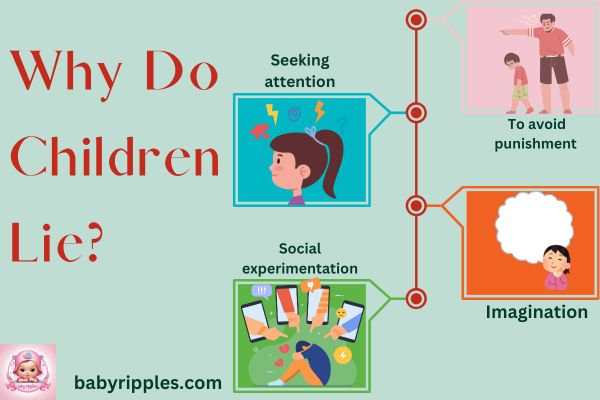It can be difficult for parents to deal with lying in children. Children frequently lie, whether it’s to get attention, stay out of trouble, or feed their creative imagination. However, cultivating honesty and trust in your family requires knowing how to deal with children’s lies. This article provides a detailed guidance on how to deal with lying in kids of all ages while fostering a supportive and understanding atmosphere.
You may want to read:4 year olds and temper tantrums
- Why Do Children Lie?
- Step-by-Step Guide: How to Deal With Children's Lies
- How to Handle Lying by Age Group
- Practical Tips to Encourage Honesty
- When Lying Becomes a Pattern
- Encouraging Honesty Through Trust-Building
- Alternative Words for Punishment: Use Guidance Instead
- Addressing Lying in Siblings
- Final Thoughts
- FAQs about how to deal with children's lies
Why Do Children Lie?

Understanding the root causes of lying helps you tackle the issue better. Here are some common reasons children might lie:
- To avoid punishment: Children fear consequences and may lie to escape them.
- Seeking attention: They might fabricate stories to feel noticed.
- Imagination: Younger children, like 4 year olds and lying, often confuse reality with fantasy.
- Social experimentation: Older children may test boundaries by lying.
By identifying the “why,” you can address the behavior more effectively.
Step-by-Step Guide: How to Deal With Children’s Lies
1. Stay Calm and Avoid Overreacting

When you catch your child lying, resist the urge to react with anger. Instead:
- Take a deep breath.
- Speak in a calm, understanding tone.
This encourages your child to open up rather than become defensive.
2. Understand the Motivation Behind the Lie
Ask questions like, “Why did you feel the need to say that?” Understanding their perspective helps you respond in a way that addresses the underlying issue.

3. Discuss the Importance of Honesty
Have age-appropriate conversations about why honesty matters. Explain how trust is built and the impact lying can have on relationships. For example:
- With 5 year olds and lying, use simple terms like, “When we tell the truth, people know they can trust us.”
- For 6 year olds and lying, introduce examples of honesty in stories or daily life.
4. Set Age-Appropriate Consequences for Lying

Clear and consistent consequences help children understand that lying is unacceptable. Tailor the response to their age:
- 4 year olds and lying: Focus on teaching moments rather than punishment.
- 6 year olds and lying: Use logical consequences, like rectifying their mistake (e.g., apologizing).
5. Praise Honest Behavior

Praising your youngster for speaking the truth, especially under trying circumstances, will help to reinforce honesty. Positive behavior is encouraged by statements such as “I appreciate that you told me the truth.”
6. Model Honesty Yourself
Children mimic what they see. Be truthful in your interactions, even about small things, to set a strong example.
7. Use Tools and Resources

Consider books or activities designed to teach honesty. Tools like storybooks about lying can help younger kids grasp the concept better.
How to Handle Lying by Age Group
When dealing with children that lie, it’s important to recognize their developmental level and adjust your strategy accordingly. A thorough explanation of how to deal with children lying according to their age group may be found below.
4-Year-Olds and Lying

Four-year-olds frequently have trouble telling the difference between reality and fiction. Their stories may be interpreted as lies due to their vivid imaginations. This is a normal aspect of their cognitive growth rather than a conscious attempt to deceive.
How to Address It:
- Acknowledge their imagination: Respond positively by saying, “That’s a creative story! Now let’s talk about what really happened.” This approach validates their creativity while gently steering them toward the truth.
- Teach reality vs. make-believe: Use examples from books or games to explain the difference between what’s real and pretend.
- Avoid labeling them as liars: Instead of reprimanding them harshly, guide them with patience and understanding.
This gentle approach helps reinforce honesty while nurturing their creativity.
5-Year-Olds and Lying

By age five, children begin to understand that lying can help them avoid trouble. This is often when they might fib to escape punishment or gain a perceived advantage.
How to Address It:
- Use age-appropriate consequences for lying: Instead of scolding, calmly explain why lying is wrong. For example, say, “When you tell the truth, I can trust you, and trust is very important.”
- Encourage correcting mistakes: If your child lies, guide them to take responsibility. For instance, if they deny spilling juice, help them clean it up while emphasizing the value of honesty.
- Promote honesty through stories: Read books or watch shows that highlight the consequences of lying and the rewards of being truthful.
At this stage, your goal is to show them the benefits of honesty while teaching them that mistakes are opportunities for learning.
6-Year-Olds and Lying

Children grasp good and wrong more clearly by the age of six. This is the perfect age to instill accountability since they are more conscious of the negative effects lying has on relationships and society.
How to Address It:
- Discuss the long-term impact of lying: Explain how lying can damage trust and hurt relationships. Use relatable examples, such as, “If you say you didn’t take the toy and I find out you did, it might make it harder for me to believe you next time.”
- Enforce fair and consistent punishment for lying: If lying occurs, implement logical consequences that fit the situation. For example, if they lied about finishing homework, they might lose screen time until the homework is completed honestly.
- Teach responsibility: Guide them to correct their actions. For example, if they lied to a friend, encourage them to apologize and rebuild trust.
Building accountability at this age sets a strong foundation for honesty and integrity in their later years.
Practical Tips to Encourage Honesty

- Create a Safe Space for Communication: Let your child feel safe sharing their thoughts without fear of harsh consequences.
- Role-Play Scenarios: Practice situations where they can choose honesty, helping them build confidence in telling the truth.
- Set Clear Expectations: Make it clear that honesty is a family value.
When Lying Becomes a Pattern
If lying persists, it might be a sign of deeper issues such as anxiety or a lack of confidence. In such cases:
- Speak to a school counselor or child psychologist for guidance.
- Maintain open communication with your child to understand their struggles.
Encouraging Honesty Through Trust-Building

Building trust takes time, patience, and consistency. Here’s how you can do it:
- Be approachable so your child feels comfortable discussing their mistakes.
- Avoid labeling them as a “liar,” which can damage their self-esteem.
- Reward honesty with verbal appreciation and trust.
Alternative Words for Punishment: Use Guidance Instead
Rather than focusing solely on punishment, emphasize guidance and teaching moments. For example:
- Instead of punishing, ask your child to correct their behavior, like apologizing if they lied to someone.
Addressing Lying in Siblings

If you have multiple children, lying might stem from sibling dynamics.
- Avoid comparisons between siblings.
- Teach them the value of honesty collectively.
Final Thoughts
Addressing how to deal with children’s lies requires patience, understanding, and consistent guidance. You may help your child accept honesty and develop trust by encouraging open communication and showing a good example. Keep in mind that every action you take contributes to the development of a more sincere and polite relationship with your child.
FAQs about how to deal with children’s lies
1. What should I do if my child keeps lying repeatedly?
If lying becomes frequent, understand the root cause. Seek professional advice if needed and reinforce honesty through consistent communication.
2. How do I address lying in a 4-year-old?
For 4 year olds and lying, focus on explaining the difference between make-believe and reality. Use gentle reminders instead of strict consequences.
3. What are some effective punishments for lying?
Effective punishment for lying includes logical consequences like apologizing, taking responsibility, or rectifying their mistake. Avoid harsh measures that might instill fear.
4. How do I teach honesty to my 6-year-old?
With 6 year olds and lying, use relatable examples and reinforce the idea that honesty builds trust. Praise them when they choose to tell the truth.
5. Can lying indicate a deeper problem in my child?
Yes, persistent lying may signal emotional struggles or confidence issues. Address the situation calmly and consider professional guidance if necessary.





